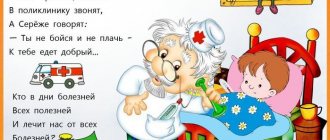The opportunity to work with children, in a quiet and comfortable office, with a stable, albeit small, salary - often speech therapists come into the profession with precisely these goals. But idealization at the start of your career can lead to disappointment in the future. Not everyone should choose this profession, says speech therapist teacher Vita Bilukha . Only by vocation and only to people whose desire to help others prevails over all others.
What features of the profession do young specialists learn about when starting their first job? What are the pros and cons? How much can you earn in the public and private sectors? And where to study to become a speech therapist after grades 9 and 11? We answer these questions in the FAN .
photo from the personal archive of Vita Bilukha /
What does a speech therapist do?
It is believed that specialists work only on sound pronunciation, that is, they teach children to pronounce sounds correctly, not to “lisp” or “burr.” In fact, the sphere of competence of a speech therapist is much broader, as is the concept of speech disorders. These include problems with speaking, reading and writing, voice disorders, stuttering, delayed speech development or its complete absence.
Each of these disorders has a reason, and the speech therapist’s task is to identify it. Speech is like a litmus test for human health, not only physical, but also mental. Its disorders may be associated with problems with hearing or the speech apparatus, or may result from more serious illnesses: mental, neurological. To assess what exactly caused the speech defect, a specialist must have a huge knowledge base in the field of anatomy, physiology, neurology, and psychology. Therefore, it is no coincidence that speech therapy is called a science at the intersection of medicine and pedagogy.
“A speech therapist helps develop literate speech,” explains speech therapist Vita Bilukha, “this means the formation and modification of words, the creation of grammatical structures. Helps develop coherent speech: the ability to correctly express one’s thoughts, compose stories from pictures, and retell texts. The specialist works on the child’s fine motor skills by performing a finger massage or inviting the child to play finger games. Teaches reading and literacy, diction and intonation, melody and tempo of speaking. Helps develop hearing and speech perception.”
Most often, specialists work with children - in kindergartens, schools, boarding schools, and clinics. But it is a mistake to consider a speech therapist exclusively a children's specialist. Even an adult can turn to a professional to eliminate speech defects. And they will help him too: you can make your speech beautiful, clear and coherent at any age.
A separate category of speech therapists is people after strokes. Speech restoration becomes one of the stages of rehabilitation and a way to return to a full life.
Objectives of an individual lesson
| Educational objectives | Formation of the concept of the mechanism of sound formation and its acoustic features; formation or consolidation of knowledge about a syllable, a word, a sentence; consolidation of the dictionary or clarification of words containing a given sound on a lexical topic (this could be “Toys”, “Autumn”, “Shoes”, etc.) |
| Corrective tasks | Development and improvement of articulatory motor skills; formation of rules for oral exhalation taking into account this phoneme; development of phonemic hearing and voice; formation of conditioned reflex connections to a given articulatory-acoustic image |
| Educational tasks | Correction of the child’s personality as a whole. |
Below, I would like to present to you, dear colleagues, the structure of an individual lesson.
Speech therapist work in kindergarten and school
“Every year the percentage of children who need speech therapy help is growing,” the expert notes. “And the later the defect is discovered, the more serious negative consequences it can have for the child’s development. Therefore, the task of a specialist working in a kindergarten is to promptly identify and prevent speech disorders in children of senior preschool age.”
In kindergartens, specialists are responsible for the development of coherent speech skills in children and the complete formation of its sound side. In other words, they teach children to hear and perceive sounds correctly, and then reproduce them correctly. They work with children individually and in groups.
In ordinary kindergartens, attention is paid only to those children who require professional help. And in specialized institutions and groups with a speech therapy focus, they are responsible for the entire educational process, building it in such a way as to help children get rid of speech problems as early as possible.
Be sure to involve parents in the work, provide consultation, and recommend correction techniques that can be used at home. If the speech therapist believes that the cause of the defect is a disease, he will recommend that the parents show the baby to a doctor - a specialized specialist. This approach helps eliminate the disorder at an early age or minimize its negative impact on the child’s development and speech.
Specialty "teacher-speech therapist"
In schools with children who are not doing well with speech, speech therapists work. Their task does not change, but it becomes more important. If a child does not perceive sounds correctly, he will usually have problems with literacy and writing. It is more difficult for him to study, remember material, and concentrate on the teacher’s words. Without correctional support, the school curriculum becomes an insurmountable obstacle for him, so it is imperative to correct violations with the help of a specialist.
“The tasks of a speech therapist at school are to promptly identify and correct speech disorders in students,” explains Vita Bilukha. “This helps to overcome difficulties that a child may have during the learning process.”
pixabay.com/
Specialty "defectologist-speech therapist"
Among speech therapists, there is a separate group of professionals who work with “special” children: toddlers and schoolchildren with intellectual disabilities. Such specialists are called defectologists: their qualifications allow them to correct defects in speech, writing, and communication skills in children with disabilities in physical and mental development.
Parents of children who have hearing and vision problems, developmental delays, memory and attention disorders, autism and cerebral palsy, and mental retardation turn to such specialists. A defectologist, of course, is not able to rid a child of the cause of the disease, however, thanks to correctional assistance, it is possible to improve the speaking and pronunciation skills of “special” children and help them communicate with loved ones and peers.
In his work, a defectologist closely interacts with doctors who “manage” the child: a pediatrician, a neuropsychiatrist. In specialized institutions, a defectologist, psychologist, and social teacher work with children at the same time. The tasks of specialists vary, but they have the same goal - to improve the quality of life of the patient under their care.
What exactly needs to be done to get into a speech therapy garden?
The staffing of preschool educational institutions today is determined by Order of the Ministry of Education and Science of Russia dated April 8, 2014 No. 293 “On approval of the Procedure for admission to training in educational programs of preschool education.”
So, how to place a child in a speech therapy group in a kindergarten.
Step 1. Get in line for a place in kindergarten - this can be done through the State Services portal (electronic) or on the official website of the mayor of Moscow.
Step 2. Receive a referral from the district clinic to undergo a PMPK (psychological-medical-pedagogical commission). To do this, you will need to visit a pediatrician, neurologist and speech therapist.
Step 3. Collect the necessary documents for the PMPC (check the exact list at the PMPC at your place of residence).
Step 4. Make an appointment at the district PMPC - this can also be done through the State Services portal.
Step 5. On the appointed day, come for the examination with your child.
Features, pros and cons of the profession of speech therapist
“In their work, a specialist needs to show great patience and restraint,” notes teacher-speech therapist Vita Bilukha. — It is important to have goodwill, communication skills, and intuition. Observation and perseverance, flexibility of mind are required. After all, often the presentation of material has to be rearranged on the fly: you expect one thing, but have to work with another.”
One of the main difficulties of the profession is the need to work with “difficult” children. Without a sincere desire to help, to go through a long path of correction step by step, patience - it is very difficult to cope with the psychological load. Another significant disadvantage is the huge number of documents that a specialist must maintain when working in a budget institution. They either get used to this or go into private practice, where the specialist determines the scope of reporting for himself.
How many hours does a speech therapist work?
The standard work rate in a budget institution is 20 hours a week, that is, a speech therapist works 4 hours a day. This is one of the advantages of the profession: such a schedule allows you not to get tired or overloaded. There is always time left for personal matters, and if you wish, you can engage in private practice in your free time.
How long is a speech therapist's vacation?
Long vacations are another plus of the profession. Its duration is 56 days. And since specialists work in schools or kindergartens, where the educational process lasts from September to May, vacations always fall only in the summer months, which is also convenient.
pixabay.com/
How much does a speech therapist earn?
The salary level does not differ from the usual in the public sector. Depending on the region and place of work, a specialist can count on 17–20 thousand rubles per month. The average salary of a speech therapist in a school is usually higher than in a kindergarten.
“A speech therapist has no career growth as such,” clarifies Vita Bilukha. “But now more and more specialists are going into private practice. Those who have self-discipline and organizational character can achieve good results. In this case, the specialist himself sets the hourly wage.”
According to the expert, only those who like to feel the usefulness of their work and who want to help people become healthier and happier can successfully realize themselves in the profession. And only in second place in importance should come short working hours and long vacations. In this case, the person will enjoy his work.
LiveInternetLiveInternet
Approved at a meeting of the activist group of defectologists in Moscow based on the decision of the board of the Moscow Education Committee dated February 24, 2000 https://www.logopedplus.ru/articles/zakon/zakon21/
Explanatory note 1. The work of a speech therapist teacher in a kindergarten that does not have specialized groups is aimed at correcting children’s speech defects. Along with corrective measures, a speech therapist teacher carries out preventive work in a preschool institution to prevent speech disorders in children. 2. A speech therapist works 5 days a week (total number of work hours - 20). The work schedule can be drawn up depending on the employment of children both in the 1st and 2nd half of the day. 3. The job responsibilities of a speech therapist teacher should only include work with children with speech pathology. 4. Children of preparatory and senior groups with simple and complex dyslalia, phonetic-phonemic disorders are selected for speech therapy classes. 5. Speech therapy examination of children in a preschool institution is primarily carried out in children 5-6 years old, other children are examined throughout the year. 6. Children suffering from stuttering, general speech underdevelopment and mental retardation should be sent to special institutions. In case of refusal to transfer a child with complex speech pathology, the speech therapist teacher is not responsible for the complete elimination of the defect. 7. The number of children studying simultaneously at the speech center should be 20-25 children throughout the year. 8. The total duration of speech therapy sessions is directly dependent on the individual characteristics of the children. As necessary, the speech therapist removes children from speech therapy classes and replaces them with others. 9. Speech correction work is carried out 5 times a week, individual or subgroup in nature. The speech therapist teacher works directly with children for all 4 hours of his working time. 10. The speech therapist teacher takes children to his classes from any of the teachers’ classes. 11. In a preschool institution, all the necessary conditions must be created for conducting speech therapy classes; there must be an isolated speech therapy room (for room equipment, see the “Program for teaching children with underdevelopment of the phonetic structure of speech”, compiled by G.A. Kashe and T.E. Filicheva ). 12. Documentation of a speech therapist teacher in a kindergarten that does not have specialized groups: - a log of the speech status of all children; - a list of children in need of speech therapy assistance, indicating the age and nature of the speech disorder; - individual notebooks for children’s activities; — class attendance log; - a speech card for each child taken to classes, indicating the date of entry and end of classes; — a plan of activities aimed at preventing speech disorders in children (consultations, seminars for educators, other preschool specialists, parents on working on the sound culture of speech). 13. An indicator of the work of a speech therapist in kindergarten is the state of sound pronunciation of children graduating to school. 14. A speech therapist teacher in a kindergarten is obliged to participate in all methodological events held in the district and improve his qualifications. 15. Certification of a speech therapist teacher for qualification category II must be carried out with the participation of a senior speech therapist in charge of the municipal territory. Since the speech therapist teacher works in a preschool educational institution, the beginning and end of the school year, the time allocated for examining children, the teaching load (20 astronomical hours per week, 4 hours per day) correspond to the established standards for speech therapist teachers in correctional (speech therapy) groups of preschool educational institutions. The speech therapist teacher works directly with children for all 4 hours of his working time. Distribution of working time The first three weeks are allocated for the complete formation of groups and subgroups of children who will study with a speech therapist in the current school year. A speech therapist works 5 days a week (the total number of hours of work per week is 20). The speech therapist teacher works directly with children for all 4 hours of his working time. The work schedule can be drawn up depending on the employment of children both in the first and second half of the day. A speech therapist teacher has the right to take students (pupils) for correctional work from any classes conducted by teachers in a group. The workload of a speech therapist teacher at 1.0 rate provides for simultaneous speech correction work for 12 to 16 children, 20 to 25 children during the year. Children with simple and complex dyslalia are accepted; in difficult cases, the speech therapist is obliged to recommend that parents attend a special speech group. In case of refusal to transfer a child with complex speech pathology, the speech therapist teacher is not responsible for eliminating the defect. Children are enrolled in groups on the basis of the following documents: - characteristics and directions of the speech therapist at the clinic; - opinions of doctors: otolaryngologist, psychoneurologist and dentist. Children diagnosed with FND are employed for up to 6 months, children diagnosed with FND - for 1 year. As speech deficiencies are corrected, the speech therapist removes children from the list and replaces them with others. Children with speech disorders of senior preschool age are selected for speech therapy classes. The child must receive individual correctional assistance at least 3 times a week. The duration of individual lessons depends on the speech diagnosis, the age of the child, the individual developmental characteristics of the child, and his psychophysical status. The time allotted for an individual lesson with a child increases if the speech therapist himself takes the child from the group and takes him to the group after the end of the lesson. The speech therapist teacher plans subgroup lessons if there are children of the same age with similar speech diagnoses (at least 6 children). The duration of a subgroup lesson should not exceed the time provided for by the physiological characteristics of the age (the program of training and education in kindergarten, the instructional and methodological letter “On the hygienic requirements for the maximum load on preschool children in organized forms of education”). The teacher-speech therapist plans speech therapy work in accordance with educational programs that meet the requirements of the state educational standard, and is responsible for their implementation not in full. Along with corrective measures, she carries out preventive work in preschool educational institutions to prevent speech disorders in children. A speech therapist teacher works with teachers of a preschool educational institution on the problem of speech development of preschool children (consultations, seminars, workshops and other forms and types of work), parents (legal representatives) attending his classes. An indicator of the work of a speech therapist is the state of the sound pronunciation of children graduating to school. Certification of a speech therapist teacher for qualification category II must be carried out with the participation of a senior speech therapist from the CMC. Equipment for a speech therapy room The speech therapy teacher’s work schedule should be posted on the door of the speech therapy room. The following equipment should be available in the speech therapy room. 1. Tables according to the number of children studying in one subgroup. 2. Sufficient cabinets or shelves for visual aids, educational material and teaching literature. 3. Wall mirror 50x100 cm for individual work on sound pronunciation; it should hang near a window with special lighting. 4. Mirrors 9x12 cm according to the number of children simultaneously engaged in pronunciation correction in a subgroup lesson. 5. A table near the wall mirror for individual work with the child and two chairs - for the child and for the speech therapist. 6. A set of speech therapy probes, ethyl alcohol for processing the probes. 7. Technical training aids. 8. Wall-mounted cash register letters. 9. Visual material used in examining children’s speech, placed in a separate box or envelopes. 10. Visual material on speech development, systematized and placed in special boxes. 11. Teaching aids in the form of cards, cards with individual tasks, an album for working on sound pronunciation. 12. Various speech games. 13. Methodological literature. 14. Towel, soap and paper napkins. The speech therapy room should be aesthetically designed and decorated with indoor plants. It is not recommended to hang paintings, prints, drawings and tables on the walls that are not related to the correctional process, as they distract the attention of children during classes and create an unnecessary diversity of the environment. Documentation and its maintenance To take into account the correctional process carried out by the speech therapist, the following types of documentation are offered: 1. A log of children's attendance at speech therapy classes. 2. Journal of examination of the speech of children attending a preschool educational institution (from 3 to 7 years). 3. Register of children in need of correctional (speech therapy) assistance. 4. Speech card for each child with a long-term work plan to correct identified speech disorders, progress results every six months, indicating the start and end dates of classes. 5. Plan of activities aimed at preventing speech disorders in children (consultations, seminars for educators, other preschool specialists, parents or their substitutes on working on the sound culture of speech). 6. Calendar plan for subgroup and individual lessons with children. 7. Notebooks-diaries for individual lessons on correcting children’s speech. 8. Class schedule certified by the head of the preschool educational institution. 9. The work schedule of the speech therapist, approved by the head of the preschool educational institution, agreed with the administration of the institution. 10. Card index listing the equipment, educational and visual aids located in the speech therapy room. 11. Copies of reports on the effectiveness of correctional (speech therapy) work for the academic year (at least for the last three years). 12. Follow-up data on children who completed a course of correctional classes through interaction with primary school teachers and kindergarten teachers over the past three years. Job description of a speech therapist teacher 1. General provisions 1. A speech therapist teacher is appointed and dismissed by the head of the educational institution. 2. A speech therapist teacher must have a higher education in defectology and improve his qualifications. 3. A speech therapist teacher in his work: - is guided by: • the Constitution of the Russian Federation; • laws of the Russian Federation; • decisions of the government of the Russian Federation and educational authorities on educational issues; • Convention on the Rights of the Child; • Charter of a preschool educational institution; • instructions for protecting the life and health of preschool children; • this job description; — must know: • developmental and special pedagogy and psychology; • anatomical, physiological and clinical foundations of defectology; • methods and techniques for preventing and correcting disorders in the speech development of students; • normative and methodological documents on issues of professional and practical activity; • program methodological literature on working with students (pupils) who have disorders in speech development; • the latest achievements of defectological science; • labor rules and regulations; safety and fire protection. 2. Functions 1. Carry out work aimed at preventing and maximizing correction of specific speech disorders and other deviations in the development of mental processes (memory, thinking, attention, etc.). 2. Develops an action plan aimed at preventing speech disorders in children (pupils) (consultations, seminars for educators, other preschool specialists, parents (persons replacing them) on working on the sound culture of speech). 3. Job responsibilities 1. Examines and determines the structure and severity of speech disorders of various origins in students (pupils) aged 3 to 7 years. 2. Completes groups for classes taking into account speech impairments of students (pupils). 3. Conducts subgroup and individual classes to correct deviations in speech development and restore impaired functions. 4. Works closely with teachers and other specialists of the educational institution, and attends classes. 5. Consults teaching staff and parents (persons replacing them) on the use of special methods and techniques to assist children with speech development disorders. 6. Maintains the necessary documentation. 7. Promotes the formation of a general personal culture, socialization, conscious choice and mastery of professional programs. 8. Uses a variety of forms, methods, techniques and means of teaching and correction within the framework of state standards. 9. Provides a level of training for students (pupils) that meets the requirements of the state educational standard, and is responsible for their implementation in full. 10. Implements educational programs of a preschool educational institution. 11. Respects the rights and freedoms of students (pupils) contained in the Russian Law “On Education”, the Convention on the Rights of the Child. 12. Systematically improves his professional qualifications. 13. Participates in the activities of methodological associations and other forms of methodological work to exchange experience in his educational institution, district, district, city. 14. Works according to a schedule based on a 20-hour work week, approved by the head of the educational institution, agreed with the trade union organization. 15. Communicates with parents. 16. Ensures the protection of life and health of students (pupils) during the educational process. 17. Complies with labor protection, safety and fire protection rules and regulations. 18. Carries out dynamic observation of children who have completed a course of correctional classes through interaction with primary school teachers, speech therapists at schools, and preschool teachers. 4. Rights 1. A speech therapist teacher has all social rights provided for by Russian legislation. 2. A speech therapist teacher has the right to be present at any classes conducted with preschoolers. 3. Improve your skills. 4. Pass certification in accordance with the “Regulations on the procedure for certification of pedagogical and managerial employees of state and municipal educational institutions” dated June 26, 2000 No. 1908. 5. Has a vacation of 56 calendar days (48 working days). 5. Responsibility 1. The speech therapist teacher is responsible for organizing propaedeutic and correctional work in an educational institution. 2. For non-fulfillment or improper execution without good reason of the Charter and Internal Labor Regulations of an educational institution, for violation of official duties established by this Instruction, other local regulations, legal orders of educational authorities, orders and orders of the head of an educational institution, he shall be subject to disciplinary punishment up to dismissal from position. 3. For violation of instructions for protecting the life and health of children, sanitary and hygienic rules for organizing the educational process, a speech therapist teacher is brought to administrative responsibility in the manner and in cases provided for by law.
Safety instructions for a speech therapist teacher Introductory part 1. A speech therapist teacher must know and follow instructions on protecting the life and health of children, safety precautions, and strictly observe labor and production discipline. 2. Study and improve safe work practices. 3. Achieve the fastest elimination of deficiencies in work that cause accidents. 4. Strictly follow the instructions on the rules for the safe use of electrical equipment, sanitary rules, fire safety rules and personal hygiene rules. Before starting work, you must: 1. Wash your hands thoroughly. 2. Prepare everything necessary for work. 3. Sterilize speech therapy probes: - by boiling in a sterilizer; - treatment with ethyl alcohol. During work it is necessary: 1. To comply with the doctor’s requirements related to the protection and promotion of children’s health. 2. Maintain speech therapy probes in accordance with sanitary and epidemiological requirements. 3. Use disposable wooden spatulas. 4. Inform the doctor about your observations of the children’s health. 5. Maintain the necessary documentation. 6. Make sure that children do not have sharp metal objects in their hands during classes. 7. Store medicines, disinfectants, matches in a closed cabinet, out of the reach of children. 8. It is prohibited to lengthen the duration of classes with children and shorten the breaks between them. 9. It is prohibited to leave children unattended. Author's note. The above provision regulates the work of a speech therapist teacher at a preschool speech center. It: — determines the hourly workload per week and the distribution of the speech therapist’s working time during the day; — the possibility of conducting speech therapy classes in the first and second half of the day is indicated; — the duration of individual and subgroup speech therapy sessions is indicated. The document also talks about the need for a speech therapist to work on the prevention of speech disorders and filling out documentation, but, unfortunately, the document does not provide time for performing these types of work.





